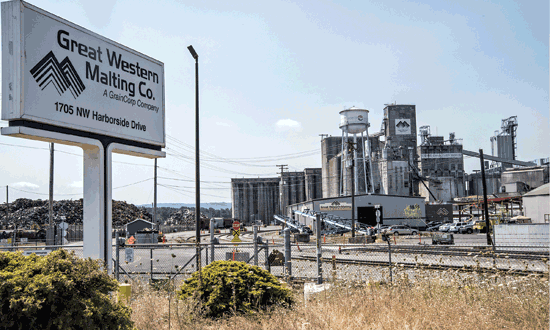With the Pacific Northwest region striving to enhance economic growth, the Port of Vancouver is in year seven of a twelve-year effort to expand port rail capacity and efficiency. The West Vancouver Freight Access Project, now fully in construction mode, is already producing jobs and an increase in economic activity.
Curtis Shuck, the port’s director of economic development and facilities, said, “Our project has been extremely strong and active throughout the U.S. recession. So really, the West Vancouver Freight Access Project has been our own little stimulus package right here in Southwest Washington.”
United Grain
At United Grain Corporation, company president Tony Flagg agreed that the rail expansion is already providing local jobs. Moreover, he said, “In the long-term, the real impact is that it continues to enable to United States to remain as a low-cost operator in the agricultural export market.”
United Grain is investing more than $80.5 million to double the company’s capacity at the port. Flagg said, “We would not have done this had the port not also been improving the rail yard.”
According to Flagg, the rail project is coming at the right time for his company. United Grain is seeing increased demand from China as its middle class grows and consumes more meat.
Flagg said, “We are also seeing significant changes on the front end of the supply chain,” as genetically-modified crop varieties allow for wider temperature and rainfall variations.
As a result, Flagg explained, the company’s transportation network is drawing an increasingly complex variety of agricultural products, including a large increase in corn and beans.
With the Columbia River channel deepened, United Grain has been able to load bigger ships, leading to lower costs and a considerable increase in business.
“The critical thing from our perspective, when we measure our capacity, we don’t measure how much storage we have, we don’t measure how much grain we can pour out the spout to the ship. Our critical measurement is how many shuttle trains we can unload in a day,” Flagg said.
BHP Billiton
The increasing rail capacity was also central in attracting mining giant BHP Billiton to the port. BHP Billiton, which chose Vancouver over 30 other contenders, will be operating a potash export terminal for a new mine operating in Saskatchewan, Canada.
“By us building this new rail access, it opens up as much as 40 percent extra capacity into the system, and that’s what’s really gained attention nationally, and helped to drive up the level of grant funding we’ve been able to receive,” Shuck noted.
Flagg said that transportation capacity development is important for American competitiveness and beneficial to consumers as well.
“Whenever you add capacity in the middle of the supply chain, it will work to the benefit of participants at both ends of the supply chain,” he said. “The result is lower costs for farmers, reduced prices in the supermarket and a more competitive export sector.”
Great Western Malting
Construction at the port is so extensive that it is motivating some companies to relocate key facilities.
“The Port of Vancouver, as a public entity, is partnering with Great Western Malting, a private company, to get what we needed in terms of our right of way,” explained Shuck. “We are essentially building our rail corridor directly through one of their facilities. Our payment to them for the new construction has allowed them to expand their facility at the port, be more competitive, and add more jobs.”
Founded in Vancouver in 1934 by local brewers, Great Western Malting provides malt for brewing and distilling. Malt barley arrives in Vancouver from a broad growing region across the northwestern United States, and continues to other parts of the country as well as Canada, Asia and South America.
The new rail line passes directly through Great Western’s Drum House processing facility. As a result, the Drum House will be replaced by a modernized processing system.
“What we did with Great Western Malting is we worked with an underutilized facility, and entered into an agreement with them to actually demolish that and run our rail line through it,” said Shuck, adding, with the public-private partnership “and the benefits it provided back to Great Western Malting’s ability to grow, they have developed a new company, Country Malt, in order to become more vertically integrated and add more services to a wider number of customers.”
With everything that is happening, the Port of Vancouver still looks forward to considerable growth in the future.
“What the port is doing will set us up for success in the next hundred years. That’s really what’s happening now,” said Shuck. “With the level of investment and the projects we’re working on, we are really focused on continuing to grow the Port of Vancouver, to set us up for future expansion… We have another 500 plus acres of land for development. The rail line we’re building will extend to support that.”




